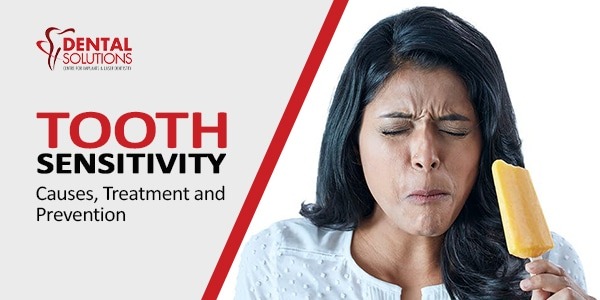- +917892951808
- Indiranagar, Bangalore
Best Dental Clinic In Bangalore Indiranagar | Best Dentist in Bangalore Indiranagar
- Home
- About Us
- Treatments
- Blog
- Contact Us
Tooth Sensitivity Causes, Prevention and Ways to Tackle the Pain

What is Toot Sensitivity?
Do you sometimes feel a sharp pain in the teeth while sipping a hot coffee or while eating an ice cream? If so, it could be Tooth sensitivity or “dentine hypersensitivity.”
Tooth Sensitivity is discomfort in the teeth triggered by stimuli such as cold, hot, sweet, or sour foods and drinks, or can be by even breathing cold air. Pain can be sharp, sudden, and shoot deep into tooth nerve endings.
Do you want to know more about the causes, treatment, and prevention of tooth sensitivity? This write-up helps you understand tooth sensitivity in a better way!
What Causes Sensitive Teeth?
According to Mayo clinic, “Sensitive teeth are typically the result of worn tooth enamel or exposed tooth roots. Sometimes, however, tooth discomfort is caused by other factors, such as a cavity, a cracked or chipped tooth, a worn filling, or gum disease.”
The bulk which forms your tooth is called dentine, which is encapsulated and thoroughly protected by tooth enamel or the gum line. When either the enamel or gum line wears down or recedes, the dentine is exposed. Since the dentine is connected to tooth nerves, they react painfully when they contact hot or cold substances.
But what makes your tooth enamel wear out or gum line to recede?
- Brushing hard: Over time, brushing too hard or using a hard-bristled toothbrush could wear down your enamel and expose the dentine. It could cause a recession of the gums (the gum tissue pulls away from the teeth).
- The recession of the gums: As gums move away from a tooth because of conditions like periodontal disease, the root surface gets exposed.
- Gum disease: Inflamed or sore gum tissue because of the loss of supporting ligaments, which exposes the root surface directly to the tooth's nerve.
- Cracked teeth: Chipped or broken teeth may create room for the bacterial build-up to enter the pulp, resulting in inflammation.
- Teeth grinding: Grinding your teeth may wear down the enamel and expose the underlying dentin.
Other Contributors of Tooth Sensitivity include:
- Using too much tooth whitening products or toothpaste with baking soda and peroxide are significant contributors to tooth sensitivity.
- Age: Age also plays a role in tooth sensitivity; it is highest between the ages 25 and 30.
- Plaque buildup: Plaque on the root surfaces can cause sensitivity.
- Using mouthwash: Long-term use of some over-the-counter mouthwashes which contain acid can worsen tooth sensitivity if you have exposed dentin (the middle layer of the tooth).
- Acidic foods: Regular consumption of foods that are high in acid content, such as citrus fruits, tomatoes, pickles and tea, results in enamel erosion.
- Recent routine dental procedures: Sensitivity can occur following teeth cleaning, root planing and scaling, and crown placement and tooth restoration. Sensitivity caused by dental procedures is temporary and would disappear in 4 to 6 weeks.
How is tooth sensitivity treated?
Not to worry! Your dentist has various approaches to treat your sensitive teeth. The type of treatment will certainly depend on the underlying cause of sensitivity. Your dentist may suggest one amongst the below varieties of treatments:
- Desensitizing toothpaste: Your dentist may recommend this special toothpaste, it contains compounds that help block the transmission of pain sensation from the tooth surface to the nerve and usually requires several applications before the sensitivity is reduced.
- Fluoride gel: This is a simple in-office technique that strengthens the tooth enamel by blocking the transmission of sensations.
- A crown, inlay, or bonding: These may be used to correct a flaw or decay that results in sensitivity.
- Surgical gum graft: If gum tissue has been lost from the root, this will protect the root and reduce sensitivity.
- Root canal. If sensitivity is severe and persistent and cannot be treated by other means, your dentist may recommend this treatment to eliminate the problem.
- Proper oral hygiene is the key to preventing acute tooth pain. Ask your dentist if you have any questions about your daily oral hygiene routine or concerns about tooth sensitivity.
How to Prevent Tooth Sensitivity?
Implementing simple preventive measures would help minimize the risk of tooth sensitivity.
Brushing gently with a softer toothbrush relieves the painful, sensitive teeth.
Grinding teeth, which is also a cause of tooth sensitivity, can be avoided to a great extent by using mouth guards at night.
Besides the above, maintaining good oral hygiene helps fight against tooth sensitivity. Timely visits to your dentist help prevent various teeth and gum problems, including the problem of sensitive teeth.
Read the below preventive measures that help alleviate the pain caused due to tooth sensitivity:
- Avoid consuming acidic food and beverages like vinegar, pickles, lemons, citrus drinks, etc. Avoid using smokeless tobacco.
- Use desensitizing toothpaste.
- Maintain good oral hygiene.
- Use soft or ultrasoft bristled toothbrush and fluoridated mouthwash.
- Make regular visits to dentists for routine dental check-ups.
Be it any cause and any level of tooth sensitivity, the professionals will help you out and offer the best treatments to alleviate the painful situation. However, by adopting preventive measures, one can easily stay away from tooth sensitivity to a greater extent.
Looking for the best dentist in your area, find it here!
